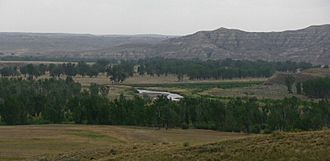Powder River Massacre facts for kids
Quick facts for kids Powder River Massacre |
|||||||
|---|---|---|---|---|---|---|---|
| Part of the Powder River Expedition, Sioux Wars | |||||||
 The Powder River near the site of the massacre in what is now Johnson County, Wyoming. |
|||||||
|
|||||||
| Belligerents | |||||||
| Cheyenne | |||||||
| Commanders and leaders | |||||||
| Yellow Woman † | |||||||
| Strength | |||||||
| 48 Pawnee Scouts, 3 officers and 2 civilians | 23 men and 1 woman | ||||||
| Casualties and losses | |||||||
| none | 24 killed | ||||||
The Powder River Massacre was a battle that took place on August 17, 1865. It was part of the Powder River Expedition. In this event, soldiers from the United States and Pawnee scouts fought against 24 Cheyenne individuals. The fight happened near the Powder River in what was then Dakota Territory. Today, this area is known as Johnson County, Wyoming.
Contents
What Happened at Powder River?
The Search for Cheyenne People
In August 1865, a military leader named Captain Frank Joshua North was on a mission. He led about 48 Pawnee Scouts, along with other soldiers and civilians. Their job was to find groups of Native Americans who were considered hostile in the Dakota Territory.
For two days, Captain North and his group followed a trail left by a band of Cheyenne people. The trail showed that the Cheyenne had about 35 to 40 horses and mules. They also had one travois, which is a type of sled used by Native Americans to carry things.
The Attack at Dawn
At 2:00 AM on August 17, Captain North's group caught up with the Cheyenne. The Cheyenne had made their camp for the night on the Powder River. This spot was about 60 miles north of Fort Connor. The small group of 24 Cheyenne were asleep in their camp.
Captain North decided to wait until dawn to attack. When morning came, his group moved closer to the camp. The Cheyenne saw the scouts approaching. They thought these were friendly Cheyenne, not Pawnee scouts, so they did not prepare to fight.
However, the Pawnee scouts suddenly charged into the camp. They surprised the Cheyenne and killed all 24 people. One of those killed was Yellow Woman, who was the stepmother of George Bent.
What Was Found After the Fight?
During the fight, Captain North's scouts lost four horses. But they captured many items from the Cheyenne camp. These included two stolen government saddles and some clothing that belonged to white women and children. They also found two U.S. Infantry coats. These coats had been given to Native Americans by Colonel Thomas Moonlight earlier in 1865.
The scouts also captured 29 horses and mules. Four of these animals had U.S. government brands. This showed they had been taken recently in battles like the Battles of Red Buttes and Platte Bridge Station. These battles happened on July 26, 1865, near what is now Casper, Wyoming. One captured horse also belonged to the Overland Stage company.
The Official Report
After the battle, a military leader named Brigadier General Patrick E. Connor wrote an official report. It was dated August 19, 1865. In his report, General Connor stated that his Pawnee scouts found and fought a group of 24 Cheyenne. He reported that all 24 Cheyenne were killed. He also mentioned that his side lost four horses but captured 29 animals and other items.
Where Did This Happen?
The exact place where the Powder River Massacre happened is not known for sure. Different diaries and reports give different ideas, saying it was anywhere from 50 to 80 miles north of Fort Connor.
It most likely took place somewhere between the mouth of Crazy Woman Creek and the town of Arvada, Wyoming. Both of these places are on the Powder River. The graves of the 24 Cheyenne who were killed have never been found.
Who Was Involved?
United States Army and Pawnee Scouts
The main group involved from the United States side was led by Captain Frank Joshua North.
- Pawnee Scouts: About 48 men were part of Company A, Pawnee Scouts, Nebraska Cavalry.
- Other Soldiers and Civilians: About four other people were with them. This included Captain Samuel M. Robbins, First Lieutenant Oscar Jewett, and two civilians named Alvin C. Leighton and Finn Burnett.
The Cheyenne Group
The Native American group involved was a small band of Cheyenne.
- Cheyenne: There were 23 men and one woman in this group. The woman, Yellow Woman, was killed during the battle.
 | Selma Burke |
 | Pauline Powell Burns |
 | Frederick J. Brown |
 | Robert Blackburn |

